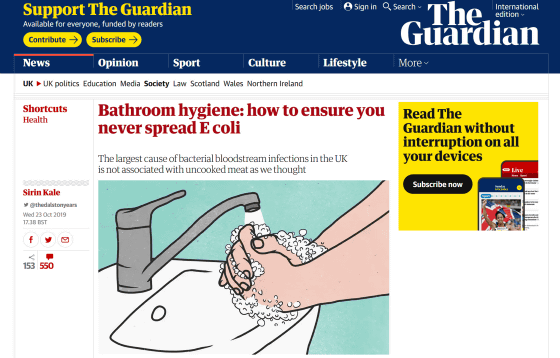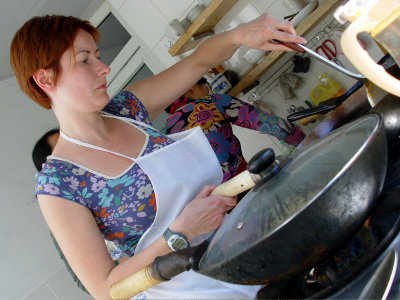Not washing hands after the toilet is a major source of E. coli infection than raw chicken

by
Washing hands after toilets is important from a hygiene point of view, but according to a new study conducted by a research team at the University of East Anglia , “If you do not wash your hands after the toilet, you will be infected with dangerous E. coli. Is the main cause. '
Extended-spectrum β-lactamase-producing Escherichia coli in human-derived and foodchain-derived samples from England, Wales, and Scotland: an epidemiological surveillance and typing study-The Lancet Infectious Diseases
https://www.thelancet.com/journals/laninf/article/PIIS1473-3099(19)30273-7/fulltext
Not washing your hands after pooping worse than eating raw meat
https://nypost.com/2019/10/23/not-washing-your-hands-after-pooping-worse-than-eating-raw-meat/
Bathroom hygiene: how to ensure you never spread E coli | Society | The Guardian
https://www.theguardian.com/world/shortcuts/2019/oct/23/bathroom-hygiene-spread-e-coli-infections

A research team led by Professor David Livermore at the University of East Anglia conducted a study to identify the main sources of ESBL-producing E. coli to find efficient strategic intervention points. The research team collects ESBL-producing Escherichia coli from beef, pork, chicken meat sold at retail stores, blood samples of bacteremia patients, British sewage, feces, etc. specific. We analyzed how genetically linked ESBL-producing E. coli collected from different sample sources are.
Although the genetic lines of ESBL-producing E. coli found in human samples are similar as a result of analysis, ESBL-producing E. coli found in animal meat is inherited from many ESBL-producing E. coli found in humans. It turns out that the target system is far away. In other words, Livermore points out that many of the ESBL-producing E. coli that infect humans are not derived from animal meat, but were infected between humans.

by
“This is unpleasant, but the main infection route for ESBL-producing Escherichia coli was from humans to humans, and fecal particles entered the mouth,” commented Livermore. Although not all ESBL-producing E. coli cause bacteremia, Livermore argues that washing hands after going to the bathroom is important to prevent infection of ESBL-producing E. coli.
According to Professor Sally Bloomfield of the London School of Public Health and Tropical Medicine , “washing your hands with soap removes the microorganisms, but they still remain alive.” “The important thing is to rinse your hands afterwards. 'The microorganisms are removed from it,' he said.
When washing hands after the toilet, it is important to use a large amount of soap, rub the palms, back of the hands and fingers for at least 15 seconds, and dry the rinsed hands to remove the remaining microorganisms. Bloomfield argued that it would be advisable to carry antibacterial hand gels when you go out because you can't use soap or running water.

by Burst
Related Posts:
in Science, Posted by log1h_ik







